In her introduction to City of Illusions she touched on something that I find I'm struggling with in my own WIP.
Villains.
Le Guin's thoughts:
Real villains are rare; and they never, I believe, occur in flocks. Herds of Bad Guys are the death of a novel. Whether they're labelled politically, racially, sexually, by creed, species, or whatever, they just don't work. The Shing are the least convincing lot of people I ever wrote.In the series of integrated stories I am finishing up, I've got some baddies that I'm just not all that satisfied with. They are called Thority (a "what if" spinning out of a world in which the transit authority ends up as the sole organization, and having access to resources they can wield quite a bit of power.)
As the stories have evolved, I've found myself needing to explain why they are bad. I didn't want it to just be because Power Corrupts. Maybe that impulse was a good one, a step away from the grey wash and the Herds of Bad Guys that Le Guin regrets in her own writing. If you give the bad guys a story, rather than just having them fit a category, maybe they will be more interesting. More real.
But the story I have told has explained away their moral culpability. They've got soft-wiring that's gone glitchy. And right now it feels again that I'm taking a step back toward category-badness. I didn't set out to write a zombie story, but in way I think Thority have ended up fitting into that trope.
So maybe Thority really aren't the villains in my stories. Maybe no-one in them is. Maybe all my characters are each doing the best they can with what they have, even if that best sometimes results in a whole lot of pain.




